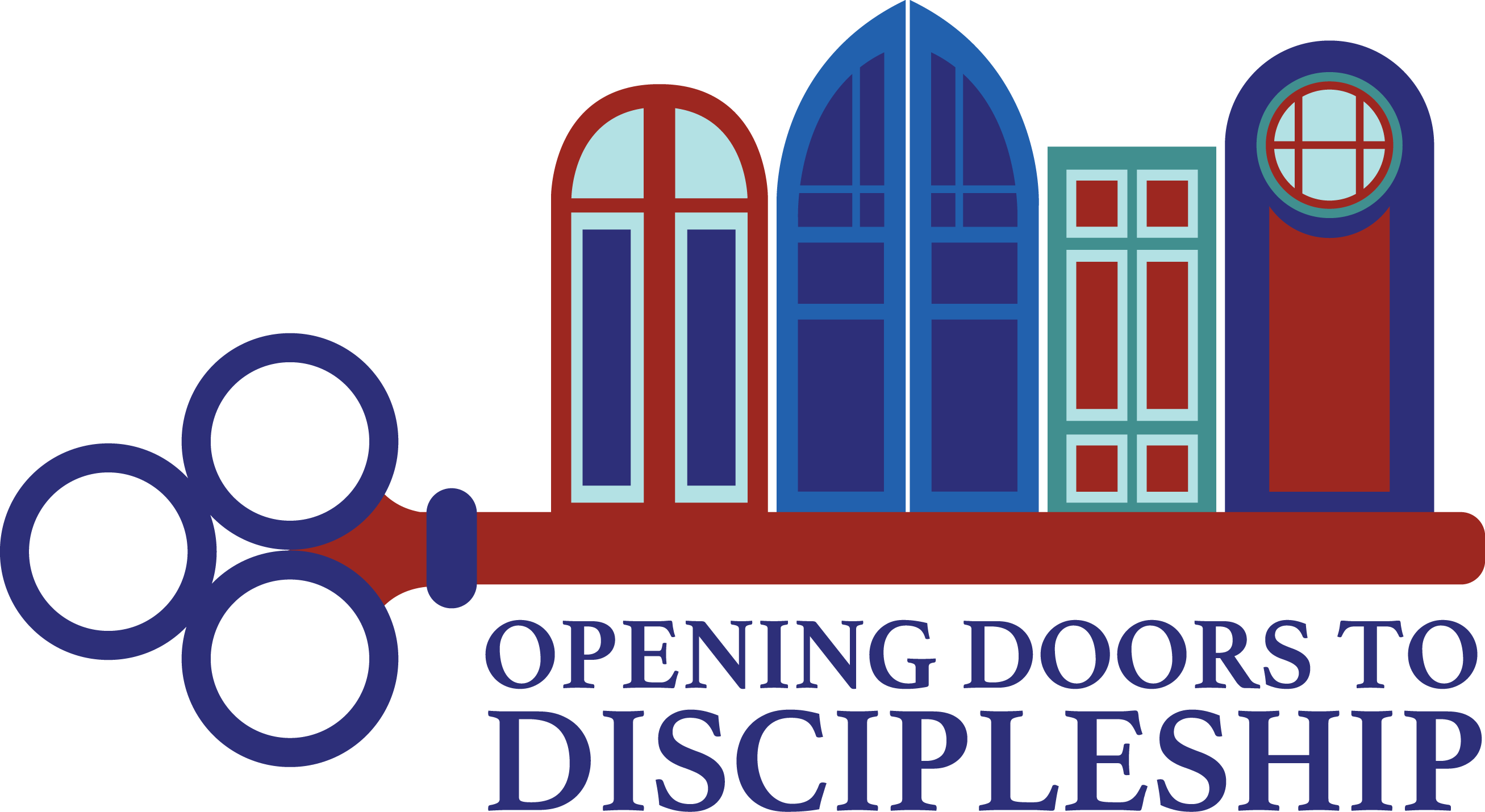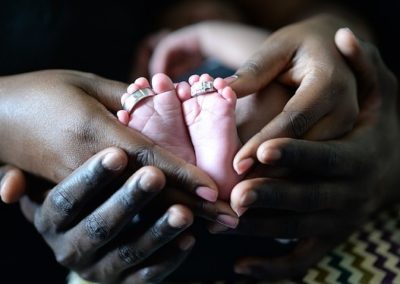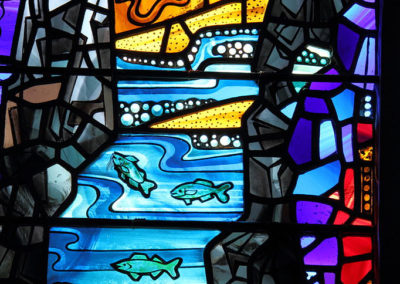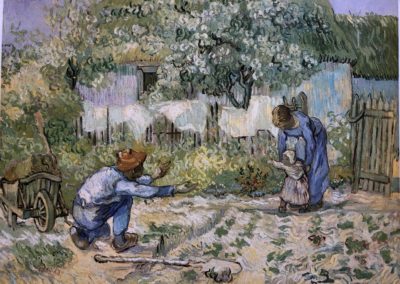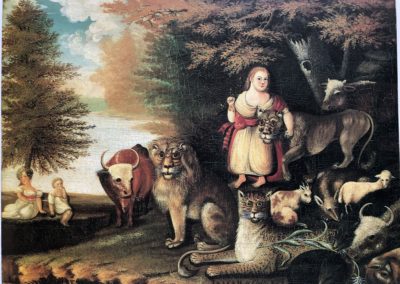Engaging this module
You are invited to explore this module by reading the content, watching the presentations and videos and responding to the suggested exercises and activities. You are encouraged to have a Bible and journaling materials nearby to take notes.
Who is God?
- Write down the top five adjectives you would use to describe God.
- What do these adjectives tell you about who God has been for you in your life? About who you want God to be for you in your life now and in the future?
- Name one or two things you have heard about God that you do not understand and have not experienced.
- What are you still seeking to learn or understand about God?
This presentation will engage our imaginations to explore who God is. If you would like to read along with the presentation, please click on the button below to download the transcript.
ACTIVITY
The wealth of biblical images of God and God’s activity in the world give us words for addressing God in prayer. “Recognizing that our language is limited and limiting, it is important to counteract those limitations by using many and varied images and metaphors as we attempt to speak about God. Our language should be as intentionally diverse and varied as is that of the Bible and our theological tradition.”
Consider putting this list where it can remind you to use them to enrich your personal prayer and those you pray with and for as you teach and lead. Circle five you might use in the coming week.
GOD BEYOND IMAGES AND WORDS, TRANSCENDENT AND IMMANENT
Who is God? How do we describe God? We have looked at images that remind us of God and explored the language we have drawn on throughout the centuries to describe God and the Trinity such as creator, redeemer, sustainer, father, mother, king, shepherd, judge, faithful, and love. Yet, even as we describe God, we know our words and images fall short of our experiences of God. In this section we are going to explore two of those experiences: 1) The times we feel God so close (there to hear our borning cry), and those times we experience God as beyond any created form or space (in light inaccessible, hid from our eyes). The theological terms used to describe these experiences are immanence and transcendence. While our tendency may be to see these as opposites, they exist together on the spectrum of our experiences of God’s presence and power in the world.
God is both close to us and bigger than anything we can fathom:
1. God is in us and creation
-
- Listen to “I was There to Hear Your Borning Cry” or “God of Great and God of Small.”
- Read Hosea 11:1-4 and John 10:1-18.
- Journal: What are the characteristics of God in the hymn and scripture passages? How is God described as close at hand in these two examples?
2. God is all powerful and outside of creation
-
- Listen to “Holy, Holy, Holy” or “Immortal, Invisible, God Only Wise.”
- Read John 1:1-18 and Job 28.
- Journal: What are the characteristics of God in this hymn and scripture passage? How is God described as unknowable and distinct from humanity and creation?
3. Journal:
- Of these two ways of experiencing God, very close, or above and beyond us, which one do you resonate with more when it comes to understanding God?
- Is it easier to see God very close and in all things or is it easier to see God in the vastness of the universe, bigger and beyond all things? Why?
- How do you most often experience God and God’s work?
This presentation will explore God’s immanence and transcendence. If you would like to read along with the presentation, please click on the button below to download the transcript.

REFLECTION
1 ) Listen to these hymns that hold the immanence and transcendence of God in tension:
2) Read Isaiah 40, Ephesians 4:4 – 6
Journal: What ways do these examples hold God’s immanence and transcendence in tension? In what ways might you use these experiences of God in teaching?
CREATED IN GOD’S IMAGE: CALLED TO LIVE IMAGE IN ACTION
Watch this video to hear what other Christian educators and faith formation have to say about being created in the image of God.
“GOD IN WORDS”
In the section, “God in Words,” five (5) descriptive titles for God are highlighted in an activity: Sovereign, Love, Provider, Planner, and Holy. These illustrative terms can be used to point to how God invites us to live; each one can be reflected in our individual and communal lives. Humans are created in God’s image and have a responsibility to reflect God in their actions. While we are not God, we strive through the power and grace of the Holy Spirit to live holy and joyful lives that reveal God in the world.
God is Sovereign
God is Sovereign. God’s sovereignty over all creation calls us to responsibility and caretaking roles for one another and the created world. When God gave humans dominion/authority over all the things on earth, God gave us responsibility for the world God loves.
We reveal God’s sovereign love and care when we care for the creation, work to see God’s rule influence the whole of our individual and institutional lives – seeking justice, freedom, and peace for all in God’s name, and act to restore relationships broken by systemic and individual sin.
God is Love
God is Love. Love is the greatest gift of all. Therefore, we are called to love, and live in love, to show others the love of God.
We show God’s love when we welcome others into our communities of faith regardless of their race, ethnicity, culture, gender identity, sexuality, economic status, or political affiliation. We show God’s love in how we treat and include the ‘least of these’ in our communities of faith (Matthew 25), including, for example, welcoming all ages and stages to participate in and lead worship. We show God’s love when we reach into and beyond our community in partnership and solidarity, with hands and hearts of love.
God Provides
As God’s children, we are called to reflect the acts of a generous and gracious God who provides for all our needs.
As a community of faith, we show that God provides all we need by serving our community – as a congregation, in partnership with local organizations, and ecumenically. Feed the hungry, clothing the naked, providing safe water for the thirsty, visiting prisoners, and offering comfort to those suffering in mind, body, and spirit are real expressions of gratitude for, and stewardship of, all God’s provision.
God has a plan
As the Master Planner, God calls us to live in trust, seek understanding, and act boldly to accomplish God’s plan as we and our faith communities comprehend it.
To proclaim God has a plan is an act of Hope. We witness to this hope in the ways we point out God’s work in the world where justice, peace, and joy are flourishing. We witness to this in the ways we gather as a community through our ordered worship and commitment to covenant community.
God is Holy
When we affirm our relationship with God and promise to walk in God’s ways, we accept the challenge to live holy lives in response to, and shaped by, God’s holiness.
All of creation reflects God’s holiness. We honor God by living lives that are holy (set apart); lives that recognize a God of love rules our hearts, souls, minds, and strength. How we speak to folks we both agree and disagree with, for example, reveals God’s holiness by rejecting harmful practices that divide neighbor from neighbor. How we care for the resources God has given us, how we worship with praise and devotion, how we withhold judgement and practice confession and forgiveness, all reveal and reflect a God who is Holy.
WHO GOD IS NOT
God is not. . . one of many
Christians are monotheists meaning that we believe in ONE GOD. We believe and affirm that our God is the one and only ruler of our lives and the cosmos. We believe all that exists came into being through God and that God continues to rule, create, sustain, and redeem us daily. We do not believe there are other lesser Gods that either serve God or rule smaller parts of the universe.
Affirmation: God is the one and only.
Chapter One – God
1.1 There is one true God
whom to know is life eternal,
whom to serve is joy and peace.
God has created all that is.
The whole universe testifies
to the majesty and power of its Maker. . .
1.5 Therefore, with the one church universal
we believe in one God, eternal Trinity, Father, Son and Holy Spirit,
three in one, one in three,
equal in power and glory.
God is the Father to whom we come,
the Son through whom we come,
the Spirit by whom we come.
(From A Living Faith, Presbyterian Church in Canada)
God is not. . . bound by the things I can see and understand
Take a deep breath and close your eyes. Think again about images of God. What first comes to mind? Now reflect on one way it would be hard to envision God. Why is that?
As educators, we must be careful how we craft and select images of God. Genesis 1 tells God said, “Let us create humankind in our image. . .in the image of God, God created them.” God does not look like one gender, one race, one ethnicity, one culture, one ability, or one age. To fully appreciate who God is, in our devotional practices we seek to experience the range of ways God is described in scripture, including images that are not anthropomorphic (seeing God as having only human characteristics).
Affirmation: God transcends my imagination. God calls me to imagine God in new ways.
(2) God is greater than our understanding.
We do not fully comprehend who God is or how [God] works.
God’s reality far exceeds all our words can say.
The Lord’s requirements are not always what we think is best.
The Lord’s care for us is not always what we want.
God comes to us on [God’s] own terms
and is able to do far more than we ask or think.
(From A Declaration of Faith, PCUS) [1]
[1] The 197th General Assembly of the PCUSA adopted The Declaration of Faith as a contemporary statement of faith, a reliable aid for Christian study, liturgy, and inspiration.
God is not . . . just like me and my thoughts
Recall one or two conflicts and disagreements you have experienced in the church community and with other followers of God. Whose side did you think God was on?
As Christians we say that God is just and loving. However, as sinners we can also acknowledge that our vision of who God loves and who deserves justice is blinded by sin. This sinful blindness causes us to think that God only loves those who look, think, act, and/or talk like us. This blindness causes us to seek justice only for those we think deserve it or have earned it. Just as God does not look like each of us individually, we cannot assume we alone know what God’s will and thoughts are, or that God’s will aligns with any political, social, or religious institution alone.
Affirmation: God is not confined by institutions, their thoughts and beliefs, or practices. God calls us to constantly seek God’s love, grace, and justice in our lives and beyond our comfort zones.
Therefore, we reject any doctrine which, in such a situation, sanctions in the name of the gospel or of the will of God the forced separation of people on the grounds of race and color and thereby in advance obstructs and weakens the ministry and experience of reconciliation in Christ. . .
We believe that, in obedience to Jesus Christ, its only head, the church is called to confess and to do all these things, even though the authorities and human laws might forbid them and punishment and suffering be the consequence (Eph. 4:15-16; Acts 5:29-33; 1 Peter 2:18-25; 1 Peter 3:15-18).
Jesus is Lord.
To the one and only God, Father, Son and Holy Spirit, be the honor and the glory for ever and ever.
(The Confession of Belhar, RCA & PCUSA)
God is not . . . a dispenser of gifts to those who earn/deserve them
We do not affirm a theology that says if you think good thoughts and do good things, you will be rewarded (prosperity gospel). Instead, we believe in a God of GRACE. A God who reached out to us before we could even know God was there, a God who loved us at creation, and a God who continues to love us. Our only response to that love and calling is a life of GRATITUDE. This life of gratitude includes praise, thanksgiving, and service. We live our lives in a way that shows God is at work in us. We are still invited to pray, to ask God for what we need, and to seek God’s presence.
Affirmation: God is the creator of all that is good. God desires well-being for all of God’s creation. God calls us to live a life of thankful service showing and revealing God’s grace in our whole being.
Q&A 62
Q. Why can’t our good works be our righteousness before God, or at least a part of our righteousness?
A. Because the righteousness which can pass God’s judgment must be entirely perfect and must in every way measure up to the divine law. But even our best works in this life are imperfect and stained with sin.
Q&A 63
Q. How can our good works be said to merit nothing when God promises to reward them in this life and the next?
A. This reward is not earned; it is a gift of grace.
Q&A 64
Q. But doesn’t this teaching make people indifferent and wicked?
A. No. It is impossible for those grafted into Christ through true faith not to produce fruits of gratitude.
(Heidelberg Catechism)
God is not standing back and watching/God has not stopped working
We are not deists. We do not believe God created a world that could move forward on its own. God did not create and then step back and watch creation unfold. NO. God is still at work. Myriads of stories throughout scripture point to God’s ongoing work and presence. God called first to Abraham and then others following him (Moses, Miriam, etc.). God called and worked with prophets and kings to redeem creation and the people of God. God came and walked among us in Jesus Christ. God is still at work in the Holy Spirit inspiring us. When we see love, grace, peace, and justice succeed and thrive — God is at work still.
Affirmation: God is at work. God is still creating. God is still redeeming. God is still calling us.
God’s Ongoing Care for Creation / Stewardship
It is in God’s nature to continue to create, redeem, and sustain this creation through people.
From the beginning, God has entrusted humans with responsibility
to care for the creation (Genesis 1:28).
We deem it a sacred responsibility and genuine opportunity to be
faithful stewards of all God has entrusted to us: our time, our talents,
and our financial resources. We view all of life as a sacred trust to be
used wisely (MCCL, #10).
God graciously partners with humanity to provide ongoing care for creation. People become God’s stewards for the care of God’s world (Genesis 1:28; Psalm 8:6-9).
(The Moravian Catechism)
CLOSING QUESTIONS FOR REFLECTION
- New experiences of God: How has your understanding of God expanded? What difference does this make to you? What more do you want to learn about God?
- New ways of living in response to who God is: How might you live differently? What troubles you from these images of God?
- Faith formation in response to who God is: Describe one way you will apply what you’ve learned in this module to your work in faith formation.
GOD AND EVIL
Read from A Declaration of Faith*
God called all he had made good.
We declare that the universe of matter, energy, and life
is God’s good creation in all its parts.
Even though evil has emerged within God’s creation,
we may work and play in it
and explore it with wonder and joy.
Evil is whatever works against the loving purpose of God
for human beings and all creation.
Natural forces may have evil effects.
Sinful human choices produce evil results.
Evil may become institutionalized in our social structures.
The power of evil to hurt and destroy,
to cut off the possibilities of full human life,
calls into question the power and goodness of God.
Whether we understand evil personally or impersonally,
we cannot explain how it originated in a world made good.
But we can affirm that evil is God’s enemy as well as ours.
In Christ, God shared our agony over evil
and broke the back of its power
by bearing the worst it could do.
God works continually to overcome evil.
In the end it will be utterly defeated.
Therefore we have courage to endure evil,
to learn from it, and combat it.
In a journal, with a respected friend and/or with a pastor or mentor, reflect on these questions:
How does A Declaration of Faith describe:
-
- What is God’s will?
- What is evil?
- If you had to talk to someone about something terrible that happened, what from this statement might be helpful?
- If you had to teach on evil and God’s goodness, how would this statement be of use? What else might you draw on?
If God is all good and all-powerful, why do bad things happen?
As church educators, we cannot get away from the question, If God is all good and all-powerful, why do bad things happen? This question has challenged the followers of God throughout the centuries. Many have tried to resolve this question including the above faith statement. And many have resolved this question in unacceptable ways. We may have experienced unexplainable loss, a tragedy, or natural disaster and heard unacceptable responses such as:
-
- Everything happens for a reason
- God needed another angel
- God was punishing a person or community
- God helps those who help themselves
- God won’t give you more than you can handle
When faced with unexplainable loss, senseless violence, or intractable suffering persons will turn to us for answers to ‘why’ God let this happen. Sometimes instead of offering an answer like the list above, our best practice is to listen to the pain and suffering, sit with the person(s), and pray. The Trauma Pastoral Care Series from Presbyterian Disaster Assistance speaks to how we serve in times of disaster and violence.
Here are some folks who have experience with personal and corporate tragedies talking about how the church and its leaders can best serve in times of unspeakable evil.
CLOSING AFFIRMATION AND PRAYER
We trust in God,
whom Jesus called Abba, Father.
In sovereign love God created the world good
and makes everyone equally in God’s image
male and female, of every race and people,
to live as one community.
But we rebel against God; we hide from our Creator.
Ignoring God’s commandments,
we violate the image of God in others and ourselves,
accept lies as truth,
exploit neighbor and nature,
and threaten death to the planet entrusted to our care.
We deserve God’s condemnation.
Yet God acts with justice and mercy to redeem creation.
In everlasting love,
the God of Abraham and Sarah chose a covenant people
to bless all families of the earth.
Hearing their cry,
God delivered the children of Israel
from the house of bondage.
Loving us still,
God makes us heirs with Christ of the covenant.
Like a mother who will not forsake her nursing child,
like a father who runs to welcome the prodigal home,
God is faithful still.
(From a Brief Statement of Faith, PCUSA)

After your time of reflection with this section, write a prayer that
-
- Uses one new way of describing God
- Gives thanks for God’s work in this world. Be specific. Pick one thing.
- Commit to one action in response to who God is.
- Close with another affirmation of thanks using another new way of describing God
